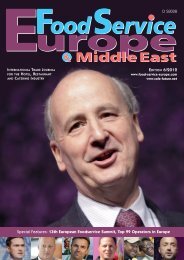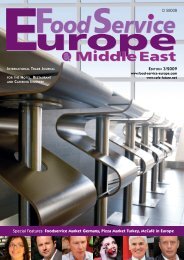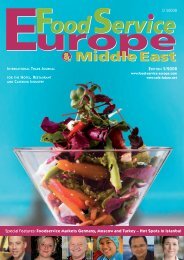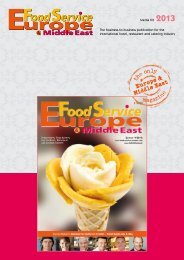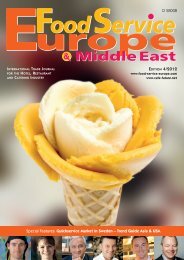suppliers - Food Service Europe
suppliers - Food Service Europe
suppliers - Food Service Europe
You also want an ePaper? Increase the reach of your titles
YUMPU automatically turns print PDFs into web optimized ePapers that Google loves.
INTERNATIONAL TRADE JOURNAL<br />
FOR THE HOTEL, RESTAURANT<br />
AND CATERING INDUSTRY<br />
D 58008<br />
EDITION 4/2009<br />
www.food-service-europe.com<br />
www.cafe-future.net<br />
Special Features: <strong>Food</strong>service Markets France, Sweden, Morocco and Singapore
4 Editorial<br />
6 Statistics<br />
<strong>Europe</strong> by Numbers<br />
8 Pan-<strong>Europe</strong>an Survey<br />
Music Festivals: Supplying Thousands<br />
with Low-priced yet Good <strong>Food</strong> –<br />
Logistics a Major Challenge (Part 1)<br />
18 Concepts to Watch<br />
Interesting New Formulas on the <strong>Food</strong>service<br />
Scene – at a Glance: Examples<br />
from Four Countries<br />
Market Analyses<br />
22 France: Top 50 Restaurant Chains/<br />
Companies with a 7.8% Sales Increase<br />
in 2008<br />
26 Sweden: The Largest Players on the<br />
Swedish Quickservice Market – Top 25<br />
Ranking, Comments and Trends<br />
30 Interview<br />
Kim Rahbek Hansen, Co-Founder and<br />
CEO of Sticks ‘N’ Sushi, Copenhagen/<br />
Denmark, one of Scandinavia’s Largest<br />
Casual Dining Brands<br />
38 Operations<br />
Sustainable Training: How to Fight the<br />
Endemic Waste and Cost Inefficiencies<br />
of <strong>Food</strong>service Training Programmes<br />
Middle East Section<br />
39 Morocco<br />
Portrait of the Country’s <strong>Food</strong>service<br />
Market: Still Heavily Dominated by<br />
Independent Operators<br />
44 Singapore<br />
A Place Where Many Asian Culinary<br />
Cultures Meet: Characteristics, Brands,<br />
Trends and Treats<br />
50 Design<br />
Fashion <strong>Food</strong>: About a Book that<br />
Presents a New Dimension of Culinary Art<br />
– the Natural Beauty of <strong>Food</strong> on the<br />
Human Body<br />
52 Quickservice<br />
John Chidsey, CEO Burger King, on Current<br />
Strategic Issues and Global Trends<br />
54 Event<br />
<strong>Food</strong> Magicians: Offshore-Catering at its<br />
Best, Provided by Marché International<br />
at Last Year’s EFSS Boat Trip on Lake<br />
Zurich<br />
56 Inspiration<br />
Creative Approaches towards the Ex -<br />
perience of Eating: Dutch Eating De -<br />
signer Marije Vogelzang<br />
60 Suppliers<br />
Coffee Machines: Operative Quests and<br />
Responding Product Solutions – a Trend<br />
Report<br />
64 Contributing Authors<br />
66 Show Dates<br />
Major Trade Fairs and Events<br />
FOODSERVICE EUROPE & MIDDLE EAST 4/09<br />
page 39 ■ ■ ■<br />
Both a major tourist attraction and an<br />
emerging manufacturing hub, Morocco<br />
has developed into an important regional<br />
foodservice market, with 27,500 outlets<br />
ringing up €2.4 bn in sales in 2008.<br />
page 44 ■ ■ ■<br />
Singapore: the tiny super-clean state in<br />
the southern-most tip of Malaysia offers<br />
a whirlwind of aromas and styles of<br />
cooking – colourful, bursting with<br />
flavour, eclectic and exciting.<br />
■ ■ ■ page 56<br />
<strong>Food</strong> is her medium: Dutch ‘eating designer’<br />
Marije Vogelzang takes a decisively unconventional<br />
approach towards the culture of food and eating.<br />
<strong>Food</strong>service professionals can learn more about<br />
her experimental and inspiring thoughts and projects<br />
at the upcoming 10th <strong>Europe</strong>an <strong>Food</strong>service<br />
Summit in Zurich (from 23 till 25 September).<br />
eMail address: <strong>Food</strong>service@dfv.de<br />
Verlagsgruppe Deutscher Fachverlag ● Mainzer Landstraße 251<br />
D-60326 Frankfurt/Main ● Phone +49.69.7595-1512 ● Fax +49.69.7595-1510<br />
C ONTENTS<br />
front cover ■ ■ ■<br />
<strong>Food</strong> fittings: Our cover image is taken from the<br />
spectacular illustrated book, Fashion <strong>Food</strong>, published<br />
in the Collection Rolf Heyne (ISBN 978-3-<br />
89910-417-2). Read more about the joint project by<br />
Helge Kirchberger and Roland Trettl on page 50.<br />
3
S UPPLIERS<br />
Keeping the Coffee<br />
By filling a social rather than a simple susten -<br />
ance need, speciality coffee bars are holding<br />
up against the recession. But tighter financial<br />
conditions require operators to give greater<br />
attention to machine investment and life<br />
costs, including the servicing implications<br />
of increasingly high-tech brewing and dis -<br />
pensing systems. Bruce Whitehall reports.<br />
Latest data from the UK, <strong>Europe</strong>’s largest<br />
branded coffee bar market, indicates that<br />
operators in the sector are continuing to<br />
defy the severe recessionary conditions.<br />
Estimates in May 2009 by consultancy<br />
Allegra Strategies forecast over 4,000<br />
branded coffee outlets trading by yearend,<br />
representing growth of more than<br />
5%. Competition is not, however, slackening.<br />
Coffee Republic, one of the sector’s<br />
pioneers, was forced into administration<br />
in July, closing about half of its<br />
company-owned units.<br />
La San Marco<br />
WMF Melitta<br />
Boom on Track<br />
Availability of suitable coffee bar sites<br />
has improved in some areas, but the UK’s<br />
four largest chains – Starbucks, Costa,<br />
Caffè Nero and Pret A Manger – currently<br />
remain under pressure to keep costs and<br />
expansion in check. A report in July from<br />
research agency Key Note, based on over<br />
1,000 UK and Irish users of branded coffee<br />
and sandwich shops, highlighted reduced<br />
average spend at coffee shops and<br />
fewer visits.<br />
The essential social appeal of the ‘affordable<br />
treat’, which created the gourmet<br />
beverage niche in the first place, has not<br />
gone away but operators are having to<br />
pay more attention to underlying issues.<br />
These range from machine servicing and<br />
usage to drink pricing and variety, both<br />
of which also have implications on<br />
equipment investment.<br />
A distinctively designed<br />
and stylish coffee machine<br />
can have an important<br />
marketing role<br />
to play on a cafe bar<br />
counter, even becoming<br />
an iconic part of a<br />
chain’s brand image –<br />
which is true for semiautomatic<br />
models<br />
(above: La San Marco’s<br />
100E DTC 2 Group) as<br />
well as for fully automatic<br />
bean-to-cup systems.<br />
Operators are also beginning to tackle<br />
overhead costs. “During the good times,<br />
people did not pay as much attention<br />
to programmed preventative main -<br />
tenance,” comments Louie Salvoni,<br />
managing director of Espresso <strong>Service</strong>,<br />
which epitomises a new type of supply<br />
business dedicated to maintaining coffee<br />
machines of all makes and avoiding the<br />
costly disruption associated with<br />
breakdowns. “But with the recession<br />
people are realising that machines are<br />
expensive and the consequent import -<br />
ance of achieving maximum efficiency<br />
through the life of the machine. They<br />
are also seeking more transparency on<br />
the costs of spare parts and energy usage<br />
so that they can plan their business<br />
better.” Michael Pluszek, operations<br />
manager at Baresso Coffee, which with<br />
60 FOODSERVICE EUROPE & MIDDLE EAST 4/09
37 branches is Denmark’s leading<br />
speciality coffee bar chain, says<br />
that he budgets for the use of professional<br />
maintenance people all<br />
year round to ensure coffee machines<br />
operate reliably. The company<br />
also strives to educate its<br />
own staff and shop managers in<br />
basic machine care, backed by an<br />
in-house ‘macchinesta’ who gives<br />
scheduled services up to four<br />
times per year to each of the<br />
chain’s espresso machines. Result:<br />
generally smooth running.<br />
“And the few times we have breakdowns,<br />
we try to learn from them,”<br />
Pluszek comments.<br />
Salvoni of Espresso <strong>Service</strong> estimates<br />
that a traditional espresso<br />
machine costing £3,000-4,000<br />
needs to be budgeted for servicing<br />
costs averaging around £500-700<br />
per year, including the mandatory<br />
legal requirement of boiler inspection<br />
plus water filter change. On<br />
fully automatic machines – increasingly<br />
installed to reduce staff<br />
training costs by reproducing the<br />
work sequences of a skilled barista<br />
– costs go up to at least £1,000-<br />
1,200 per machine, he suggests.<br />
Equipment for making filter coffee<br />
typically entails less onerous servicing<br />
because of fewer moving<br />
parts and unpressurised water<br />
boiling. Leading manufacturer<br />
Bunn estimates average annual<br />
cost of repairs on its filter coffee<br />
equipment at around £150/ €175<br />
per annual service.<br />
Breakdown protection<br />
What about machine malfunction<br />
in use, which can severely damage<br />
customer service? According to<br />
Salvoni, typical problems tend to<br />
involve components such as a<br />
dripping tap or a leaking solenoid<br />
rather than catastrophic ‘dead<br />
machine’ scenarios. But loss of,<br />
say, one of the groups on a three<br />
group espresso machine can significantly<br />
impair service speed in a<br />
busy coffee bar.<br />
One of the most common causes<br />
of problems is scaling up of boilers<br />
■ ■ ■ Coffee Machines: Top Trends ■ ■ ■ ■ ■ ■<br />
● Growing sales of dairy-heavy beverages – hot and cold – plus<br />
tighter safety controls demand efficient and hygienic systems of<br />
milk handling.<br />
● As chains grow, consistent machine performance and drink<br />
taste become critical, irrespective of local variations in water<br />
quality.<br />
● Rising costs of staff training benefit from on-board inter-active<br />
control panels with multi-lingual capabilities and more compelling<br />
display technology.<br />
● Chains look to machines with on-board computer facilities for<br />
multi-outlet monitoring, recipe downloading, promotions and<br />
auditing.<br />
● As outlets for speciality coffee widen, self-service capability<br />
grows in importance, especially on bean-to-cup machines,<br />
along with compact dimensions for limited counter space.<br />
● Safe operation demands cool-to-touch casings with no sharp<br />
edges.<br />
● All kinds of site, from speciality coffee shops to designer bars<br />
and cruise liners, increasingly see machines with distinctive<br />
finish and colour as an important contributor to outlet brand<br />
image.<br />
● With provenance and fresh-to-cup becoming prime customer<br />
expectations, bean grinders need to be matched to the different<br />
needs of espresso and filter coffee.<br />
● Modular design makes it easier to customise machines to speci -<br />
fic coffee shop needs.<br />
● Attention to the ergonomics of production – such as foot operated<br />
steam wands – can help speed up service.<br />
FOODSERVICE EUROPE & MIDDLE EAST 4/09<br />
61
■ ■ ■ Coffee Machines Suppliers ■ ■<br />
– a selection of international coffee machine<br />
companies –<br />
● Bunn-O-Matic<br />
Founded 1957<br />
Headquarters Springfield (Illinois)/USA<br />
Sales n.a.<br />
Sales focus in <strong>Europe</strong> filter drip brewers; grinders<br />
Top <strong>Europe</strong>an sales territories UK, Netherlands,<br />
Scandinavia, Germany, Spain, France<br />
Main applications (in descending order) coffee<br />
bars, QSRs, hotels, banqueting, casual dining,<br />
bars/pubs<br />
Claims to fame the first flat-bottom paper coffee<br />
filter for commercial use and the first pourover<br />
coffee brewer. www.bunn.com<br />
● Franke<br />
Founded 1909<br />
Headquarters Aarburg/Switzerland. Subsidiaries in<br />
Germany, USA, Netherlands, Japan<br />
Employees 12,000<br />
Group sales (worldwide) CHF2,936 m<br />
– Franke Coffee Systems CHF200 m<br />
Brands include Franke, Bremer, Viva<br />
Coffee machine production 2,000 sq m plus the<br />
Coffeerama Coffee Competence Centre, which is<br />
being rolled out to Franke subsidiaries; over 550<br />
employees<br />
Claims world leadership in ‘intelligent coffee systems’.<br />
www.franke-cs.com<br />
● La San Marco<br />
Founded 1920<br />
Headquarters Gradisca d’Isonzo/Italy<br />
Total sales (worldwide) €24 m<br />
Countries where La San Marco products sold<br />
approx. 80 (all 5 continents plus the McMurdo<br />
research station in Antarctica)<br />
Top 3 <strong>Europe</strong>an markets Italy, France, Greece<br />
Sales focus traditional espresso machines, from<br />
semi to fully automatic<br />
Factory area 7,000 sq m<br />
Claim to fame ‘designed in Italy, made in Italy, sold<br />
everywhere’. www.lasanmarco.com<br />
● Melitta System<strong>Service</strong><br />
Founded 1908<br />
Headquarters Minden/Germany<br />
Part of the Melitta Group, MSS makes and distributes<br />
commercial filter coffee machines and fully<br />
automatic espresso machines made at Minden and<br />
by Swiss subsidiary Cafina<br />
Sales approx. €123 m (MSS)<br />
Employees about 600 (MSS)<br />
Distribution subsidiaries in Switzerland, Austria,<br />
France, Netherlands, Belgium, Japan, USA<br />
Sales partners in over 50 countries<br />
www.melitta.de<br />
● WMF<br />
Founded 1853<br />
Headquarters Geislingen/Steige, Germany<br />
Group sales (flatware, gifts, kitchen and serving<br />
devices, cookware, coffee machines) €795.8 m<br />
– WMF and Schaerer brands €240 m<br />
Employees 5,951<br />
Coffee machine focus fully automatic machines for<br />
coffee specialities, filter, espresso and combination<br />
models. www.wmf.de<br />
Franke, Spectra (with Flavour Station)<br />
and pipework in areas where water is<br />
hard or inconsistent. “In other words, the<br />
machine is receiving water which has<br />
not been treated with a scale preventer,”<br />
Salvoni points out. “That can stop a machine<br />
working as well as lower the qual -<br />
ity of the drinks.” Best answer is a carbon<br />
or resin-based water filter, which typically<br />
needs changing on an annual basis,<br />
depending on the size of the filter and the<br />
amount of water throughput.<br />
Machine choices<br />
Scale problems tend to affect all types of<br />
machine, whether traditional espresso<br />
machines, fully automatic bean-to-cup<br />
systems or filter brewer-dispensers. Preferences<br />
for such machines still vary<br />
geographically across <strong>Europe</strong>. “In North<br />
Euro pean countries, coffee out of home<br />
means cappuccino and latte, with only a<br />
little percentage for espresso,” comments<br />
Paolo Fenu, director of communications<br />
at La San Marco. The greater emphasis<br />
on serving milk-based drinks demands<br />
greater staff productivity and<br />
speed of service and therefore creates a<br />
much greater bias in the region to fully<br />
automatic espresso machines.<br />
By contrast, coffee out of home in Southern<br />
<strong>Europe</strong> means espresso, with cappuccino<br />
taken only till mid-morning and<br />
latte not very popular except in Spain.<br />
“So the coffee machines used in South<br />
<strong>Europe</strong> are mainly traditional, semiautomatic<br />
models focused on making<br />
the perfect espresso,” Fenu comments.<br />
Fleshing out the situation in Northern<br />
<strong>Europe</strong>, a 2008 report from Allegra<br />
Strategies found just over half of all UK<br />
coffee bar customers preferring to drink<br />
latte (a rise of 13% over a 38% estimate in<br />
2000) and 44% choosing cappuccino (a<br />
slight decline on the 50% registered in<br />
2000). By comparison, 21% chose the<br />
Americano or long black style of coffee<br />
and just 12% opted for a simple espresso.<br />
The now very significant demand for<br />
milky styles of drink is something of a<br />
two-edged sword. While it gives a major<br />
marketing opportunity, it also presents<br />
operational challenges. As a live, bac -<br />
terially sensitive product, milk clings to<br />
surfaces when heated and can clog<br />
pipework. The self-cleaning systems typically<br />
offered on machines only do so<br />
much – usually a blast of steam through<br />
areas where the milk passes – so typically<br />
need to be supplemented with application<br />
of sanitising solution at the end of<br />
daily trading.<br />
For maximum flexibility in applications<br />
where skilled baristas are employed,<br />
steam wands – constantly wiped with a<br />
sanitising cloth during the day – are generally<br />
the preferred option, enabling various<br />
quantities of milk to be heated and<br />
frothed quickly to order. On systems<br />
such as the Franke Autosteam Pro, both<br />
the steaming temperature and the air<br />
supply can be programmed individually<br />
for each drink, and for other products<br />
such as soups and scrambled eggs.<br />
Sufficient space provision in the frontof-house<br />
for reliable holding of milk at<br />
stable temperatures is also an issue, especially<br />
if it is required to offer two or<br />
FOODSERVICE EUROPE & MIDDLE EAST 4/09
more types of milk (full fat,<br />
skimmed, soya, etc). Franke recently<br />
introduced a base refriger -<br />
ation unit for siting directly under<br />
its Evolution and Spectra machines<br />
and able to take up to 5 l of<br />
a single milk or 2 x 2.5 l of different<br />
milk types. An option called Chill<br />
& Cup combines chilled milk storage<br />
with the ability to keep up to<br />
120 cups warm in minimum<br />
space.<br />
An on-board Plug & Clean rinsing<br />
system is fitted as standard to the<br />
WMF Prestolino, a compact (325<br />
mm wide x 555 mm deep) automatic<br />
machine able to output<br />
espresso, cafe creme, cappuccino,<br />
latte macchiato, espresso macchiato<br />
and also hybrid concoctions<br />
like chociatto. The machine’s<br />
frother rinse means that staff<br />
simply connect the milk tube to<br />
the adapter and press the cleaning<br />
button. All the parts that carry<br />
milk are then cleaned and it<br />
should, the company says, only be<br />
necessary to submerge the milkcarrying<br />
parts in cleaning fluid<br />
once a week.<br />
Alternatively, it is possible to<br />
rinse the milk frother automat -<br />
ically for a period of from one and<br />
ten mi nutes. This cleans the milk<br />
frother with cold and hot water,<br />
plus steam after the last drink<br />
containing milk has been poured.<br />
Add itionally, an extra cooler<br />
holding up to 6.5 l of milk can be<br />
specified.<br />
Versatility in providing a range of<br />
milked drinks is also a feature of<br />
the Bar-Cube fully automatic coffee<br />
machine developed by Germany-based<br />
Melitta System<strong>Service</strong><br />
(MSS). It can be fitted with an<br />
optional refrigerated unit holding<br />
up to 3 l of milk and users can<br />
specify an integrated system for<br />
push-button heating, frothing and<br />
dispensing milk into drinks or a<br />
steam outlet where barista-style<br />
service is preferred. Machines are<br />
HACCP-certified and milk hand ling<br />
systems are designed for simple<br />
dismantling.<br />
MSS says it has paid particular attention<br />
to features which help staff<br />
use machines as efficiently as possible,<br />
such as a twin serving system<br />
enabling two drinks to be<br />
FOODSERVICE EUROPE & MIDDLE EAST 4/09<br />
dispensed simultaneously and a<br />
large graphic display using 3D animation<br />
to up to 18 possible products<br />
and access information such<br />
as the level of coffee grounds and<br />
the start time of the automatic<br />
self-cleaning programme.<br />
As for maintenance overhauls,<br />
machines should, the company<br />
says, be able to achieve 30,000<br />
product servings (of milk-mix beverages)<br />
before the first major<br />
maintenance on machines such as<br />
Bar-Cube and Cup, and up to<br />
60,000 on the Alpha automatic<br />
espresso machine made by its<br />
Switzerland-based Cafina subsidiary.<br />
Widening drink<br />
choice<br />
One issue arising from the widening<br />
choice of milked beverages is<br />
the growing demand for both hot<br />
and cold drinks. The Swiss-developed<br />
Black & White Cool bean-tocup<br />
brewer-dispenser is built to<br />
make a wide range of drinks with<br />
milk portions drawn, heated and<br />
foamed within the machine at the<br />
press of a button. It can also dispense<br />
cold milk and so can also<br />
dispense various chilled summer<br />
drinks suitable for flavouring with<br />
syrup. It does this from a single<br />
machine which has compact dimensions<br />
(350 mm wide) and is<br />
built to a modular design to simp -<br />
lify servicing.<br />
The potential of widening and customising<br />
menus with added-syrup<br />
beverages has recently been taken<br />
on board by Franke with an addon<br />
unit called the Flavour Station.<br />
The 20 cm wide unit holds three<br />
syrup bottles for connection to the<br />
company’s Spectra S machine;<br />
there is also a 32 cm, six bottle version<br />
for the larger Evolution Plus<br />
system.<br />
Customising<br />
Fully automatic machines are essentially<br />
designed so that staff<br />
simply place a cup under a spout<br />
and press a button or keypad. But<br />
an element of customising is possible<br />
on the WMF Prestolino with a<br />
63
S UPPLIERS<br />
■ ■ ■ More Coffee Machines ■ ■ ■ ■ ■ ■ ■ ■<br />
– other international brands –<br />
Animo, Netherlands (A, F) www.animo.nl<br />
Bezzera, Italy (E) www.bezzera.it<br />
Brasilia, Italy (E) www.brasilia.it<br />
Bravilor Bonamat, NL (A, F) www.bravilor.com<br />
La Cimbali, Italy (E, B) www.cimbali.com<br />
Egro, Switzerland (A, B, F) www.egro-coffee.com<br />
Faema, Italy (E, B) www.faema.it<br />
Fetco, USA (A, F) www.fetco.com<br />
Fracino, UK (E, B) www.fracino.co.uk<br />
Gaggia, Italy (E, B) www.gaggia.it<br />
Grindmaster, USA (A,E,F) www.grindmaster.com<br />
La Marzocco, Italy (E) www.lamarzocco.it<br />
La Pavoni, Italy (E, B) www.lapavoni.it<br />
Rancilio, Italy (E) www.rancilio.it<br />
Rex Royal/HGZ, CH (A,B,E) www.rex-royal.com<br />
La Spaziale, Italy (E) www.laspaziale.it<br />
Thermoplan/Black & White, CH (B, E) www.thermoplan.ch<br />
Wega, Italy (E) www.wega.it<br />
Abbreviations: A = automatic brewer/dispensers and beverage centres;<br />
B = bean-to-cup push button espresso makers; E = espresso coffee machines;<br />
F = filter/drip coffee makers<br />
INTERNATIONAL TRADE JOURNAL FOR THE HOTEL, RESTAURANT &<br />
CATERING INDUSTRY 4/09<br />
Published by: Deutscher Fachverlag GmbH<br />
Address: Mainzer Landstrasse 251,<br />
60326 Frankfurt am Main, Germany<br />
Mail address: 60264 Frankfurt am Main,<br />
Germany<br />
Supervisory Board: Klaus Kottmeier, Andreas<br />
Lorch, Catrin Lorch, Peter Russ<br />
Executive Management Board: Dr. Rolf<br />
Grisebach, Peter Kley, Michael Schellenberger,<br />
Holger Knapp<br />
Divisional Managing Directors: Peter Esser,<br />
Florian Fischer, Markus Gotta<br />
Phone: +49.69.7595-01, fax: -1510<br />
eMail: info@food-service-europe.com<br />
Editor-in-chief: Gretel Weiss (-1511). Editor<br />
in charge according to German press law.<br />
Managing editor: Marianne Wachholz (-1513)<br />
Editors: Susanne Corinth (-1799), Heike<br />
Hucht (-1506), Barbara Mecke (-1503),<br />
Jutta Pfann schmidt-Wahl (-1514), Katrin<br />
Schendekehl (-1512), Katrin Wissmann (-1798)<br />
Sales manager: Christian Heinrici (-1791)<br />
Marketing manager: Philipp Laqué (-2461)<br />
Circulation manager: Klaus Gast (-1972)<br />
Director print media services: Kurt Herzig (-2461)<br />
Print production: Hans Dreyer (manager) (-2463)<br />
Logistics: Veronika Lorey (manager) (-2201)<br />
Design, graphical layout: Ines Knetsch<br />
Printed in Germany by: SocietätsDruck,<br />
Kurhessenstrasse 4-6, 64546 Mörfelden-Walldorf<br />
Banks:<br />
Frankfurter Sparkasse, Frankfurt am Main,<br />
Germany. Sorting code: 500 502 01, account<br />
number: 34926, SWIFT CODE: HELA DEF 1822<br />
Commerzbank Frankfurt am Main, Germany<br />
Sorting code: 500 400 00, account number:<br />
586555500, SWIFT CODE: COBA FF<br />
Subscription (6 issues/year): <strong>Europe</strong> excl.<br />
Germany €115.56 (incl. mailing fees and 7%<br />
VAT), Germany €108.00 (incl. mailing fees and<br />
€7.07 VAT), other countries €128.00 (incl.<br />
mailing fees).<br />
The publisher does not assume and hereby<br />
disclaims any liability to any person for any<br />
loss or damage caused by errors or omissions<br />
in the material contained herein, regardless of<br />
whether such errors result from negligence,<br />
accident or any other cause whatsoever.<br />
<strong>Food</strong><strong>Service</strong> <strong>Europe</strong> & Middle East<br />
Copyright by Deutscher Fachverlag GmbH<br />
All rights reserved. ISSN 1436-4379<br />
Other hotel & restaurant publications by<br />
Verlagsgruppe Deutscher Fachverlag:<br />
Germany: food-service, gv-praxis.<br />
In our affiliate Matthaes Verlag:<br />
AHGZ with supplement Der Hotelier.<br />
Austria: Österreichische Hotel & GV Praxis,<br />
Verlagsbüro Salzburg, Schrannengasse 2,<br />
A-5020 Salzburg, phone: +43.662.877108,<br />
fax: +43.662.877108-3, office@hgvpraxis.at<br />
Poland: food service polska; Polnischer<br />
Fachverlag GmbH, ul. Jadzwingwo 14,<br />
Pl-02-692, Warsaw, phone/fax:<br />
+48.(0)22.6442180, pwf@pwf.com.pl<br />
‘barista’ button which enables operators to make drinks<br />
stronger or weaker to suit individual customers.<br />
Modular construction at the WMF factory also means that<br />
operators can specify specific features relevant to their outlets,<br />
such as the choice of mains water connection or onboard<br />
tank and one or two bean grinders, or one mill plus a<br />
chocolate or topping container. Any external colour can be<br />
chosen from a mixture of blue, red and yellow.<br />
The need to make espresso machines simpler, both for baristas<br />
and in servicing terms, is recognised as a priority by Rancilio,<br />
the Italian coffee machine specialist which last year<br />
merged with the equally long-established Swiss coffee machine<br />
manufacturer Egro. Load & Show software uses a USB<br />
flash drive connection to enable technicians to easily set and<br />
check the working parameters of the company’s Classe 10<br />
espresso machines before machines have even been installed,<br />
enabling counters and error reports to be checked remotely<br />
from the office or workshop. Settings can be copied<br />
and transferred between Classe 10 machines, making it easy<br />
to standardise menus and operational profiles across a chain<br />
of outlets.<br />
Filter fights back<br />
Filter or filter drip machines generally lack the flamboyance<br />
of espresso machines. Clements Coffee, with ten branches in<br />
Northern Ireland, set out to convert its customers to a more<br />
Czech Republic and Slovakia: <strong>Food</strong> <strong>Service</strong><br />
CR/SR, Tschechischer und Slowakischer Fach -<br />
verlag, Drtinova 10, 15000 Prague 5,<br />
phone: +42.(0)2.27018418-420,<br />
fax: -2701401, e-mail: food@con-praha.cz<br />
Russia: Mojo Delo Restaurant.<strong>Food</strong> <strong>Service</strong>,<br />
Russ. Fach verlag, 2-nd Zvenigorodskaya 2/1,<br />
123100 Moscow, phone/fax: +7.095.748-0103,<br />
lud@moyo-delo.ru<br />
When an article presented by an author is accepted<br />
by the Publishing Company, the Publishing<br />
Company is granted the exclusive publication<br />
rights for the duration of the statutory<br />
copyright period. This transfer of copyright<br />
particularly covers the rights of the Publishing<br />
Company to reproduce (per microfilm, photocopy,<br />
CD-ROM or other processes) the article<br />
for business purposes and/or to feed it into<br />
either electronic or non-electronic data bases.<br />
Contributing Authors<br />
Jan Börjesson, Delfi Marknadspartner, Upplands<br />
Väsby/Sweden<br />
Mario Cañizal Villarino, Business on <strong>Food</strong> <strong>Service</strong>,<br />
Barcelona/Spain<br />
Flavia Fresia, HoReCa Magazine, Milan/Italy<br />
Puck Kerkhoven/Karel de Vos Hilversum/<br />
The Netherlands<br />
Vytautas Mickevicius, Restoranu Verslas, Vilnius/Lithuania<br />
Michael Schaefer, Euromonitor International,<br />
Chicago (IL)/USA<br />
Sofia Selberg, Conceptuelle, Stockholm/Sweden<br />
Jim Sullivan, Sullivision, Appleton (WS)/USA<br />
Bruce Whitehall, Wallington/UK<br />
Translation Richard Hockaday, Frankfurt (M)/<br />
Germany<br />
64 FOODSERVICE EUROPE & MIDDLE EAST 4/09
Italian offer. “We pride ourselves on<br />
training staff to be proper baristas,”<br />
points out Managing Director John Elliott.<br />
“But while a lot of customers like the ambience<br />
of our units, they still just want a<br />
‘normal’ coffee. So filter coffee is still very<br />
popular and represents about 35-40% of<br />
all coffee sales. The process of educating<br />
people here about espresso – moving them<br />
along the food chain, so to speak – is still<br />
at an early stage.” Alongside La Marzocca<br />
espresso machines, Clements uses Bunn<br />
filter drip machines, recently upgraded to<br />
latest models with upgraded electronics<br />
and improved boiler technology.<br />
Lina Chiodo, director of sales and marketing,<br />
Bunn <strong>Europe</strong>-Middle East-Africa<br />
(EMEA) believes that, if in-home consumption<br />
is also factored in, filter machines<br />
still outnumber espresso machines<br />
across <strong>Europe</strong>. At the same time,<br />
growing choices in quality coffees and<br />
increased awareness of ethicallysourced<br />
alternatives is taking filter coffee<br />
beyond being simply a lower cost option.<br />
The Speciality Coffee Association of<br />
<strong>Europe</strong> (SCAE), which applies Gold Cup<br />
FOODSERVICE EUROPE & MIDDLE EAST 4/09<br />
Bunn, Titan Single<br />
certification to quality coffees, cites research<br />
which shows that <strong>Europe</strong>an consumers<br />
will pay 15% more for Fair Trade<br />
and organic coffee.<br />
Various small but significant refinements<br />
to minimise operating glitches are<br />
visible on filter brewing systems. For example<br />
on the recently launched Bunn Titan,<br />
designed to brew one or two 12-lbatches<br />
of coffee in under six minutes,<br />
the brew funnels are equipped with filter<br />
paper retainer rings to keep the filter<br />
paper from folding in when water is<br />
added on smaller batches. Electronic<br />
funnel locks come standard to prevent<br />
removal of the funnel while brewing. Machines<br />
use Bunn’s BrewWizard technol -<br />
ogy for step-by-step programming of<br />
brew level, cold brew lock-out and tank<br />
temperature.<br />
Bunn is also attempting to help oper -<br />
ators respond more effectively to tighter<br />
financial conditions by forecasting machine<br />
operating costs more accurately,<br />
especially at larger venues operating a<br />
variety of different beverage service<br />
points. With the company’s interactive<br />
profit calculator, aimed mainly at hotels<br />
venues with beverage service in breakfast<br />
buffets, meeting rooms, cafeterias,<br />
banquet rooms, restaurants and employee<br />
canteens, operators input variables<br />
such as coffee cost, serving size, beans<br />
used per batch and other variables to assess<br />
equipment investment criteria. The<br />
system works in euro, pound, dollar and<br />
yen currencies and in metric or English<br />
measurements. ■<br />
S UPPLIERS<br />
65



